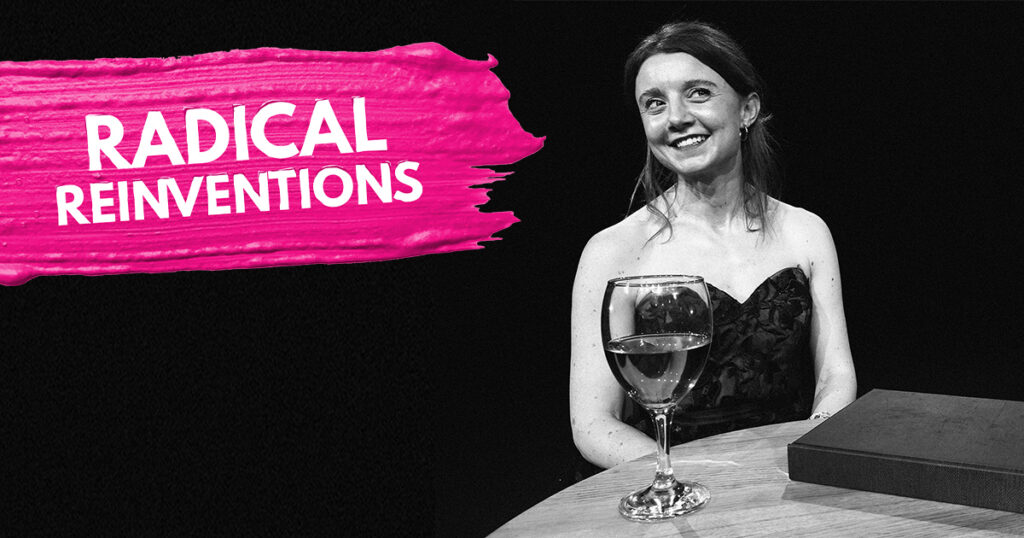
What’s in a text? The novel, the written word – what’s it made of? The paper, the binding, the ink? Or something more elusive and ethereal? The four plays comprising the Sherman Theatre’s ‘Radical Reinventions’ series explored this question in earnest. Referencing everything from Goethe to Grindr, these plays used a handful of props and lashings of creativity to examine (in thirty minutes or less) why we continue to tell these stories hundreds, or even thousands, of years later.
Two of the plays, The Love Thief and Tilting at Windmills, I have already enthused about. I happened to see the final night of performances of Hamlet is a F&£$boi and The Messenger, which allowed me to reflect on how and why these four plays affected me so deeply.

Hamlet is a F&£$boi is written and performed by Winners’ Lowri Jenkins and directed by Mared Swain, based on the works of William Shakespeare among others. Essentially Fleabag meets My Fair Lady (only with the roles reversed), the play follows the lovelorn Evie (Jenkins), who would very much like to take a match to tinder and burn the whole thing to the ground. Fed up with the foibles of flesh and blood boyfriends, she turns to fiction to find her own personal Mr Darcy. Jenkins is daring and dynamic, and the play itself a whirlwind of venom and melancholy that savagely skewers the modern dating scene.

I wonder how Jenkins would have dealt with three of Shakespeare’s heavyweights – like Romeo and Macbeth, for example – instead of teaming Hamlet with Paris (from Homer’s The Iliad) and John Proctor (from Arthur Miller’s The Crucible) – though it would be hard to improve on such a funny and powerful play. It’s genuinely hilarious to watch Jenkins convey the waning swooniness of her literary crushes (and to watch her mimic the puffed-up bravado of the titular heartthrob), not to mention how genuinely affecting it is to watch her explore the reasons why we return to books and when we should put them down.

The Messenger is written and performed by Sherman Associate Artist Seiriol Davies (How to Win Against History) and directed by the Sherman’s Artistic Director Joe Murphy. Inspired by Romeo and Juliet, The Messenger is a musical epic in miniature, charting the changeable fortunes of its titular emissary, trainee priest Giovanni (real name: Shane), as he is tasked with a holy mission that might just determine the fate of the fisticuffs between the Montys and the Cap-Caps.

The Catholic Church urges Shane/Giovanni not to climb every mountain, definitely not to ford every stream, and to avoid rainbows like the plague (though after the last two years, I think we’re going to have to seriously rethink that idiom) – and he does just that, with a lot of singing, rhyming and sexy dance fighting along the way. I have genuinely never been more entertained; Davies is a one-man West Side Story, blazing through each number with brio and spiriting the audience away on a breathlessly anarchic adventure.

So, other than the obvious, why have the Sherman Theatre’s ‘Radical Reinventions’ continued to occupy my mind? It’s because they’re not only rollicking good stories, but that they speak to why we continue to tell stories at all: because they give us permission to hope, to dream, to love, and to live vividly and boldly and bravely. They’re not only smashing the text, they’re remaking it for a new, better world. Fiction, like life, has its limits – but as long as there are barriers and binaries alike, the Sherman Theatre and its exceptional talent will continue to break through them.
All four of the Radical Reinventions have been a joy; together, they are a triumph.

Hamlet is a F&£$boi is now available to stream on demand anytime until 24th December and you can see The Messenger’s Seiriol Davies as The Ghost of Christmas Present in A Christmas Carol at the Sherman until 31st December. (Tilting at Windmills is also available to stream on demand anytime until 24th December – here’s why you should).


